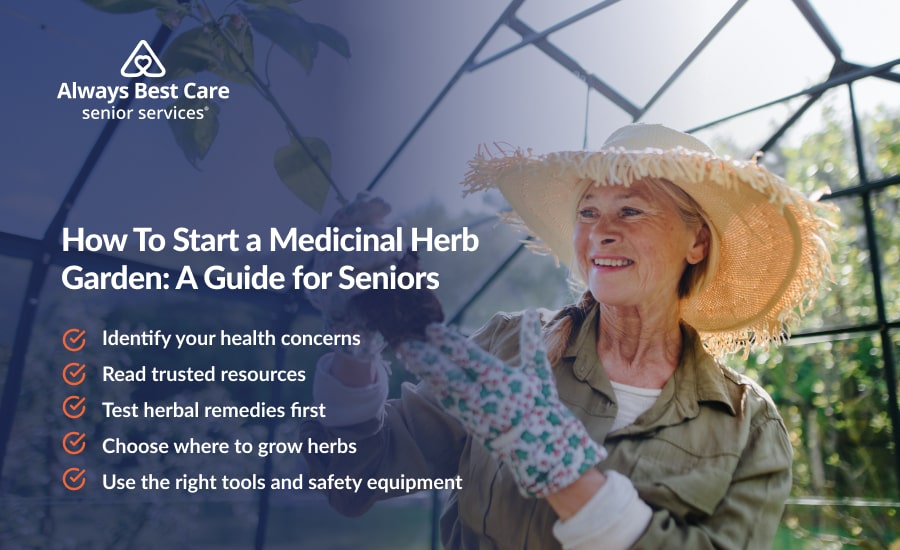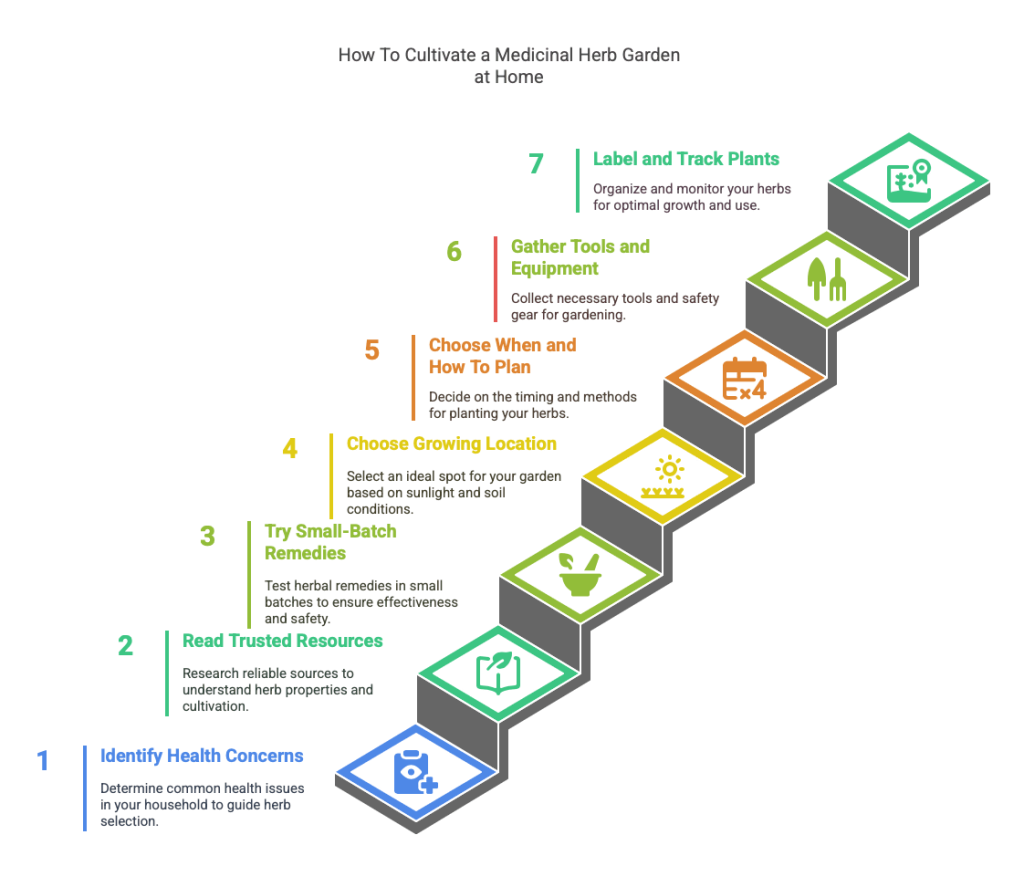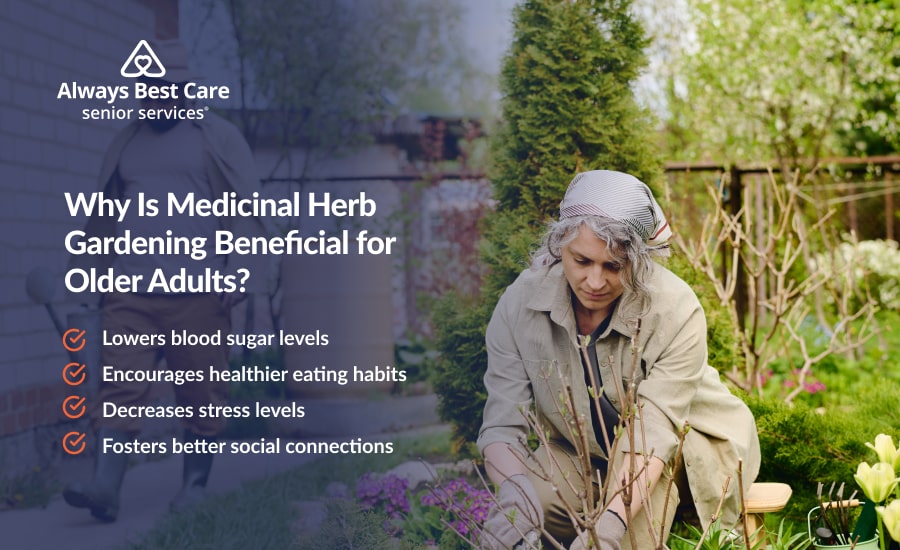How To Start a Medicinal Herb Garden: Easy Steps for Seniors

Table of Contents
Medicinal Herb Garden: Key Points
- When starting a herbal garden, identify common household health concerns to grow herbs that support your family’s needs
- Read trusted guides from herbalists and botanical experts for beginner-friendly advice
- Opt for tools that are light, easy to grip, and designed to reduce stress on your hands and joints
- Label your plants to make tracking easy
- Explore how Always Best Care’s companionship services can make daily activities more meaningful
A recent study found that people who grow edible plants, including herbs, at home are more likely to meet U.S. dietary guidelines for fruits and vegetables.
For older adults, this makes gardening more than just a peaceful pastime. It’s a practical way to promote healthier eating, stay active, and improve overall well-being.
In this guide, we will:
- Share easy instructions on how your elderly loved one can start their medicinal herb garden
- Cover key benefits of gardening for older adults
- Explore how companionship services at Always Best Care can support your loved one
How To Start Cultivating Your Own Medicinal Herb Garden
Cultivating herbs at home is a simple, rewarding way to support your well-being.
Whether you’re aiming to ease everyday ailments or just enjoy fresh, fragrant plants, growing medicinal herbs gives you a hands-on connection to your health, right from your own backyard.
1. Identify Common Health Concerns in Your Household
When researching medicinal herbs, everything can sound beneficial and tempting to grow. However, trying to grow them all at once can quickly become overwhelming.
A more focused approach is to base your garden on the health issues that come up most often in your household.
Think about recurring concerns like allergies, colds, headaches, insect bites, or digestive issues. Planning your herb garden around your specific needs makes it both more practical and easier to maintain.
2. Read Trusted Resources
Turn to reputable resources from experienced herbalists and botanical experts, as they can offer easy-to-follow information that can help you feel more confident as you begin.
Once you’re comfortable with the basics, you can explore blogs, videos, or gardening groups to deepen your knowledge at your own pace.
3. Try Small-Batch Herbal Remedies Before You Plant
If it’s winter or the end of your growing season, you might not have access to all the herbs you’re interested in growing.
This is a great time to purchase small amounts, dried or fresh, from a reputable supplier and try out a few simple remedies, like herbal teas, salves, or tinctures.
Testing how well they work for your needs can help you decide which herbs are worth growing in your own garden when planting season returns.
4. Choose Where To Grow Your Medicinal Herbs
Once you’ve picked your herbs, it’s time to find the perfect spot where they’ll thrive.
You can create a dedicated medicinal herb garden, tuck herbs into your vegetable beds, use containers on your patio, or mix and match.
For example, herbs like oregano, dill, and basil do well in vegetable gardens and help attract pollinators. Lemon balm and peppermint thrive in pots you can place in the kitchen, making them easy to harvest.
You might even build a raised bed just for favorites like yarrow, calendula, and lavender.
Whether you group herbs together or spread them out, choose what works best for your space and routine.
5. Decide When and How To Start Your Medicinal Herbs
Decide whether to start from seed or use transplants.
Easy starters like basil, dill, calendula, and yarrow grow well from seed, while herbs like lavender, peppermint, and echinacea are better suited for transplanting.
Once you’ve decided, check your average last frost date and plan your seed starting or transplant schedule accordingly, just like you would for vegetables.
6. Get the Right Tools and Safety Equipment
Consider lightweight, ergonomic tools with padded handles or longer grips to reduce strain on your hands and joints.
A kneeling pad or garden bench can help make planting and weeding more comfortable.
Don’t forget the essentials! You’ll need a wide-brimmed hat, gloves, breathable clothing, and plenty of water to stay protected and hydrated.
7. Label and Track Your Plants
Opt for waterproof markers to label each herb, especially similar-looking ones like mint and lemon balm.
Keep a simple journal to note planting dates, growth progress, harvest times, and how each herb supports your health. This helps you fine-tune your garden each season.

Key Benefits of Medicinal Herb Gardening for Older Adults
Gardening offers more than just beautiful blooms and fresh produce; it’s a rewarding way to support your physical, mental, and emotional well-being.
For older adults, tending to a garden can encourage movement, spark joy, and nurture a strong sense of purpose and connection.
1. Improved Blood Sugar Levels
Gardening keeps your loved one active and engaged through gentle, heart-healthy physical activity like digging, planting, pruning, and raking.
Just 30 minutes a day in the garden can help manage high blood pressure, improve circulation, and support overall well-being.
2. Healthier Eating Habits
Growing your own fruits and vegetables makes healthy eating easier and more enjoyable. It deepens the appreciation for fresh food, encourages variety in meals, and offers the satisfaction of harvesting what you’ve grown.
3. Reduced Stress Levels
Gardening, like most exercise, helps lower stress by triggering the release of endorphins and endocannabinoids, also known as natural chemicals that ease pain and boost mood.
4. Better Social Connections
Participating in family or community gardens helps older adults feel more connected and supported.
Sharing gardening tasks, swapping tips, and celebrating harvests together can reduce feelings of isolation and build meaningful relationships with neighbors, friends, and loved ones.

Explore Companionship Services at Always Best Care
Gardening is more than just growing herbs; it’s a soothing and meaningful activity that supports the body, mind, and spirit.
For older adults, caring for a medicinal herb garden can offer light exercise, reduce stress and bring a different kind of joy.
With our companionship services, the experience becomes even more special.
Our expert caregivers can assist with planting, watering, and harvesting, all while sharing joy, conversation, and experiencing the small wins of gardening.
Medicinal Herb Garden: FAQs
1. What are the easiest medicinal herbs to grow for beginners?
For elderly individuals, it’s best to start with low-maintenance herbs that offer reliable health benefits. Ideal beginner options include:
- Mint: Aids digestion and grows easily in containers
- Chamomile: Calming and helpful for sleep and stress
- Basil: Supports immune health and is simple to grow
- Lavender: Promotes relaxation and thrives with minimal care
- Lemon: A gentle mood booster that grows well in partial sun.
2. How can I make gardening easier for my elderly loved one?
You can make herb gardening more comfortable and accessible with a few smart adjustments:
- Use raised beds or containers to reduce bending or kneeling
- Choose lightweight, ergonomic tools to minimize strain
- Install a drip irrigation system to simplify watering
- Garden during the early morning or late afternoon to avoid midday heat and reduce the risk of fatigue
3. Are there any health risks associated with using medicinal herbs?
While medicinal herbs offer many benefits, it’s important to use them safely:
- Talk to your doctor or pharmacist before using herbs, especially if you’re on medication. Some herbs can interact with prescriptions, reduce their effectiveness, or cause side effects.
- Avoid self-dosing or combining herbs without expert guidance
- Watch for allergies or skin sensitivities, especially with herbs like arnica or comfrey
4. How can I use the herbs I grow for health benefits?
There are several safe, simple ways to enjoy the herbs you grow:
- Teas: Steep herbs like chamomile, mint, or lemon balm
- Topical use: Infuse oils with calendula or lavender for skincare
- Aromatherapy: Dry herbs for sachets or essential oil blends to ease stress
- Cooking: Add fresh herbs like basil or thyme to meals for both flavor and wellness





